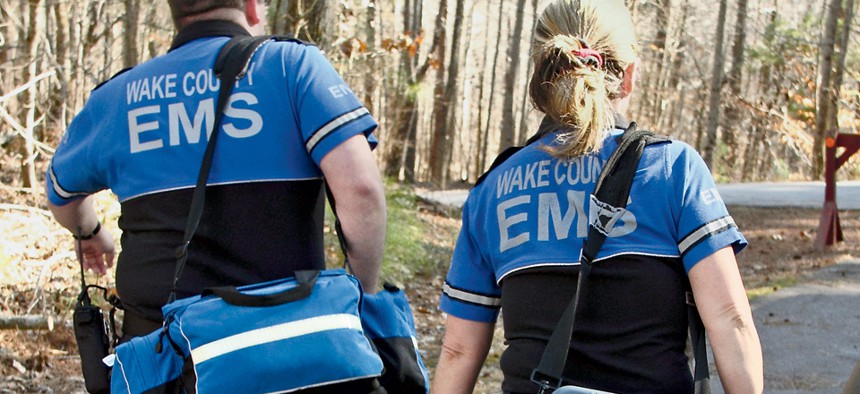
Emergency responders prepare to treat an injured visitor at Umstead State Park in North Carolina, where EMS research has improved patient survival rates. Michael J. Legeros
Code Red
Thanks to smart data analysis, medics in North Carolina are saving more heart patients’ lives.
When Jeffrey Hammerstein started working as a paramedic in the 1980s, the odds of a cardiac-arrest patient surviving were slim. Not just in Wake County, North Carolina, where he still works, but anywhere in the nation.
Standard guidelines for cardiopulmonary resuscitation, or CPR, suggested that paramedics only perform the procedure for about 25 minutes—guidance that is still followed by emergency medical technicians across the nation. But Hammerstein began noticing that a patient’s pulse, when the person showed some minimal signs of heart activity, would sometimes return to normal when chest compressions were continued for a longer period of time.
“All of a sudden at the 45-minute level we’d have a pulse back,” Hammerstein says, recounting how county officials began analyzing local EMS data. What they learned could change the way paramedics across the nation respond to cardiac-arrest patients.
“The first half of my career, with a cardiac arrest, nobody survived, with very rare exceptions,” he says. “Then that really started to change in the 2000s, when we changed the way we did resuscitation.”
Wake County paramedics, who respond to about 500 cardiac-arrest calls annually, began performing CPR for longer periods of time. “We started to get pulses back on those cases,” he says. “That’s where it started to translate, where we got more people who were surviving.”
But was there a firm connection between the length of time chest compressions were performed and survival rates?
Through a comprehensive data analytics project, Wake County Emergency Medical Services, with help from the SAS Advanced Analytics Lab for State and Local Government, collected data from county cardiac-arrest responses from 2005 to 2012 and looked at patient outcomes.
They found that if Wake County paramedics had continued under the 25-minute guideline from 2005 to 2012, 100 people, who ultimately left the hospital, would have died.
As a result, Wake County changed its CPR recommendations to encourage paramedics to continue the procedure beyond the 25-minute mark if the patient has not already flat-lined. In patients where there are some minimal signs of cardiac activity, paramedics may continue CPR for up to an hour without worrying about the additional risk that patients will end up in a vegetative state.
“Through the ’80s and into the ’90s, we looked at cardiac-arrest patients as not survivable. Now we don’t look at that [person] as a dead person,” Hammerstein said. “We haven’t written them off.”
County officials in January presented their findings to the National Association of EMS Physicians, which named the study as the “Best EMS Professional Research Presentation.”
“The national EMS community has taken notice but they’re waiting to see the full version in manuscript form,” says Wake County EMS Deputy Medical Director Jefferson Williams. To get a full grasp on the cardiac-arrest data, the county needed the expertise of SAS, based in Cary, just outside Raleigh. “To do something like this it takes a lot of time to get it into an analytical form,” Williams says. County officials are working to put their findings in manuscript form so peer EMS organizations can study them more closely.
“By practicing evidence-based medicine guided by data, many Wake County residents are alive today who wouldn’t have been,” says Dr. Brent Myers, the director of Wake County EMS. “Our recognition at the annual meeting gives us hope that our approach will be replicated by other EMS groups around the country and save more lives.”
It will require more time and study to determine whether the discoveries in Wake County, which now has a 16 percent survival rate for cardiac-arrest patients—roughly double the national average—will change the way the rest of the nation approaches emergency medical response.
NEXT STORY: The Forum







